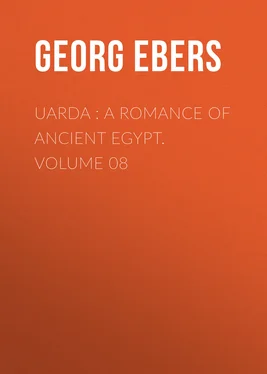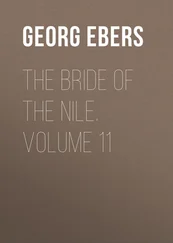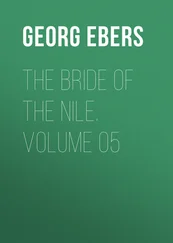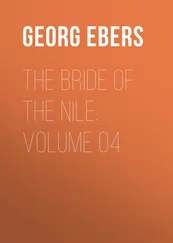Georg Ebers - Uarda - a Romance of Ancient Egypt. Volume 08
Здесь есть возможность читать онлайн «Georg Ebers - Uarda - a Romance of Ancient Egypt. Volume 08» — ознакомительный отрывок электронной книги совершенно бесплатно, а после прочтения отрывка купить полную версию. В некоторых случаях можно слушать аудио, скачать через торрент в формате fb2 и присутствует краткое содержание. Жанр: Альтернативная история, literature_19, foreign_antique, foreign_prose, Исторические приключения, на английском языке. Описание произведения, (предисловие) а так же отзывы посетителей доступны на портале библиотеки ЛибКат.
- Название:Uarda : a Romance of Ancient Egypt. Volume 08
- Автор:
- Жанр:
- Год:неизвестен
- ISBN:нет данных
- Рейтинг книги:5 / 5. Голосов: 1
-
Избранное:Добавить в избранное
- Отзывы:
-
Ваша оценка:
- 100
- 1
- 2
- 3
- 4
- 5
Uarda : a Romance of Ancient Egypt. Volume 08: краткое содержание, описание и аннотация
Предлагаем к чтению аннотацию, описание, краткое содержание или предисловие (зависит от того, что написал сам автор книги «Uarda : a Romance of Ancient Egypt. Volume 08»). Если вы не нашли необходимую информацию о книге — напишите в комментариях, мы постараемся отыскать её.
Uarda : a Romance of Ancient Egypt. Volume 08 — читать онлайн ознакомительный отрывок
Ниже представлен текст книги, разбитый по страницам. Система сохранения места последней прочитанной страницы, позволяет с удобством читать онлайн бесплатно книгу «Uarda : a Romance of Ancient Egypt. Volume 08», без необходимости каждый раз заново искать на чём Вы остановились. Поставьте закладку, и сможете в любой момент перейти на страницу, на которой закончили чтение.
Интервал:
Закладка:
Georg Ebers
Uarda : a Romance of Ancient Egypt – Volume 08
CHAPTER XXXIII
An hour later, Ani, in rich attire, left his father's tomb, and drove his brilliant chariot past the witch's cave, and the little cottage of Uarda's father.
Nemu squatted on the step, the dwarf's usual place. The little man looked down at the lately rebuilt hut, and ground his teeth, when, through an opening in the hedge, he saw the white robe of a man, who was sitting by Uarda.
The pretty child's visitor was prince Rameri, who had crossed the Nile in the early morning, dressed as a young scribe of the treasury, to obtain news of Pentaur—and to stick a rose into Uarda's hair.
This purpose was, indeed, the more important of the two, for the other must, in point of time at any rate, be the second.
He found it necessary to excuse himself to his own conscience with a variety of cogent reasons. In the first place the rose, which lay carefully secured in a fold of his robe, ran great danger of fading if he first waited for his companions near the temple of Seti; next, a hasty return from thence to Thebes might prove necessary; and finally, it seemed to him not impossible that Bent-Anat might send a master of the ceremonies after him, and if that happened any delay might frustrate his purpose.
His heart beat loud and violently, not for love of the maiden, but because he felt he was doing wrong. The spot that he must tread was unclean, and he had, for the first time, told a lie. He had given himself out to Uarda to be a noble youth of Bent-Anat's train, and, as one falsehood usually entails another, in answer to her questions he had given her false information as to his parents and his life.
Had evil more power over him in this unclean spot than in the House of Seti, and at his father's? It might very well be so, for all disturbance in nature and men was the work of Seth, and how wild was the storm in his breast! And yet! He wished nothing but good to come of it to Uarda. She was so fair and sweet—like some child of the Gods: and certainly the white maiden must have been stolen from some one, and could not possibly belong to the unclean people.
When the prince entered the court of the hut, Uarda was not to be seen, but he soon heard her voice singing out through the open door. She came out into the air, for the dog barked furiously at Rameri. When she saw the prince, she started, and said:
"You are here already again, and yet I warned you. My grandmother in there is the wife of a paraschites."
"I am not come to visit her," retorted the prince, "but you only; and you do not belong to them, of that I am convinced. No roses grow in the desert."
"And yet: am my father's child," said Uarda decidedly, "and my poor dead grandfather's grandchild. Certainly I belong to them, and those that do not think me good enough for them may keep away."
With these words she turned to re-enter the house; but Rameri seized her hand, and held her back, saying:
"How cruel you are! I tried to save you, and came to see you before I thought that you might—and, indeed, you are quite unlike the people whom you call your relations. You must not misunderstand me; but it would be horrible to me to believe that you, who are so beautiful, and as white as a lily, have any part in the hideous curse. You charm every one, even my mistress, Bent-Anat, and it seems to me impossible—"
"That I should belong to the unclean!—say it out," said Uarda softly, and casting down her eyes.
Then she continued more excitedly: "But I tell you, the curse is unjust, for a better man never lived than my grandfather was."
Tears sprang from her eyes, and Rameri said: "I fully believe it; and it must be very difficult to continue good when every one despises and scorns one; I at least can be brought to no good by blame, though I can by praise. Certainly people are obliged to meet me and mine with respect."
"And us with contempt!" exclaimed Uarda. "But I will tell you something. If a man is sure that he is good, it is all the same to him whether he be despised or honored by other people. Nay—we may be prouder than you; for you great folks must often say to yourselves that you are worth less than men value you at, and we know that we are worth more."
"I have often thought that of you," exclaimed Rameri, "and there is one who recognizes your worth; and that is I. Even if it were otherwise, I must always—always think of you."
"I have thought of you too," said Uarda. "Just now, when I was sitting with my sick grandmother, it passed through my mind how nice it would be if I had a brother just like you. Do you know what I should do if you were my brother?"
"Well?"
"I should buy you a chariot and horse, and you should go away to the king's war."
"Are you so rich?" asked Rameri smiling.
"Oh yes!" answered Uarda. "To be sure, I have not been rich for more than an hour. Can you read?"
"Yes."
"Only think, when I was ill they sent a doctor to me from the House of Seti. He was very clever, but a strange man. He often looked into my eyes like a drunken man, and he stammered when he spoke."
"Is his name Nebsecht?" asked the prince.
"Yes, Nebsecht. He planned strange things with grandfather, and after Pentaur and you had saved us in the frightful attack upon us he interceded for us. Since then he has not come again, for I was already much better. Now to-day, about two hours ago, the dog barked, and an old man, a stranger, came up to me, and said he was Nebsecht's brother, and had a great deal of money in his charge for me. He gave me a ring too, and said that he would pay the money to him, who took the ring to him from me. Then he read this letter to me."
Rameri took the letter and read. "Nebsecht to the fair Uarda."
"Nebsecht greets Uarda, and informs her that he owed her grandfather in Osiris, Pinem—whose body the kolchytes are embalming like that of a noble—a sum of a thousand gold rings. These he has entrusted to his brother Teta to hold ready for her at any moment. She may trust Teta entirely, for he is honest, and ask him for money whenever she needs it. It would be best that she should ask Teta to take care of the money for her, and to buy her a house and field; then she could remove into it, and live in it free from care with her grandmother. She may wait a year, and then she may choose a husband. Nebsecht loves Uarda much. If at the end of thirteen months he has not been to see her, she had better marry whom she will; but not before she has shown the jewel left her by her mother to the king's interpreter."
"How strange!" exclaimed Rameri. "Who would have given the singular physician, who always wore such dirty clothes, credit for such generosity? But what is this jewel that you have?"
Uarda opened her shirt, and showed the prince the sparkling ornament.
"Those are diamonds–it is very valuable!" cried the prince; "and there in the middle on the onyx there are sharply engraved signs. I cannot read them, but I will show them to the interpreter. Did your mother wear that?"
"My father found it on her when she died," said Uarda. "She came to Egypt as a prisoner of war, and was as white as I am, but dumb, so she could not tell us the name of her home."
"She belonged to some great house among the foreigners, and the children inherit from the mother," cried the prince joyfully. "You are a princess, Uarda! Oh! how glad I am, and how much I love you!"
The girl smiled and said, "Now you will not be afraid to touch the daughter of the unclean."
"You are cruel," replied the prince. "Shall I tell you what I determined on yesterday,—what would not let me sleep last night,—and for what I came here today?"
"Well?"
Rameri took a most beautiful white rose out of his robe and said:
Читать дальшеИнтервал:
Закладка:
Похожие книги на «Uarda : a Romance of Ancient Egypt. Volume 08»
Представляем Вашему вниманию похожие книги на «Uarda : a Romance of Ancient Egypt. Volume 08» списком для выбора. Мы отобрали схожую по названию и смыслу литературу в надежде предоставить читателям больше вариантов отыскать новые, интересные, ещё непрочитанные произведения.
Обсуждение, отзывы о книге «Uarda : a Romance of Ancient Egypt. Volume 08» и просто собственные мнения читателей. Оставьте ваши комментарии, напишите, что Вы думаете о произведении, его смысле или главных героях. Укажите что конкретно понравилось, а что нет, и почему Вы так считаете.












